
Together with the USA and China, Europe is one of the three leading global economies. Yet, while Europe has a significantly larger population than the US, it is behind in economic production, and even more so in terms of highly successful entrepreneurship. China has far more successful entrepreneurs than Europe and is even slightly ahead in terms of superentrepreneurs per capita. Despite this, some European economies such as Ireland, Sweden, the UK, and Switzerland, rank as being amongst the most entrepreneurial in the world. The success of these economies shows that Europe indeed can compete with the USA and China in global entrepreneurship. Yet European entrepreneurship is hindered due to high taxes, limits on entrepreneurship in women-dominated fields of the economy, and a lack of European market integration.
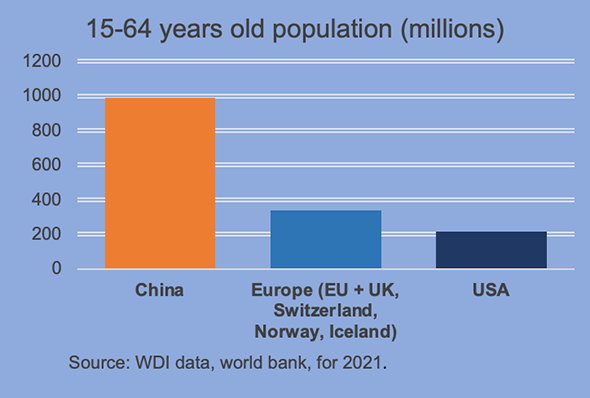
In total, the EU countries, UK, Switzerland, Norway, and Iceland have nearly 338 million citizens between 15-64 years old. While China has nearly three times higher population, the population of the USA is below two thirds that of Europe. The total economic production of Europe is 22 trillion current US$, slightly below 23 in the USA, but ahead of 18 in China.
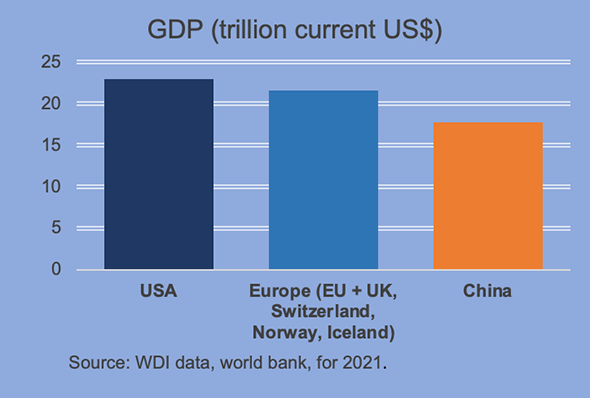
In terms of highly successful entrepreneurship however, Europe is considerably behind China as well as the USA. The superentrepreneurs project focuses on the nearly 2,500 individuals in the world who have built up billion-dollar fortunes by creating new firms or growing small businesses into large, successful ventures. The point is to measure the tip of the iceberg: by looking at such superentrepreneurs, we can understand better which countries are more supportive of free enterprise.
In total there are 304 superentrepreneurs in Europe, less than half of the 662 in the USA, and slightly more than a third of the 877 in China. China is a country in which the vast majority of the population lived in extreme poverty 30 years ago, and much of the wealth has been created in the last generation. This explains why China has more superentrepreneurs than even the USA. The USA has for long been the dominant global economy, yet the economic model of the country is dynamic, and a considerable share of the wealth has been created in the last generation. Europe on the other hand still relies largely on past fortunes, with more limited opportunities for new wealth creation.
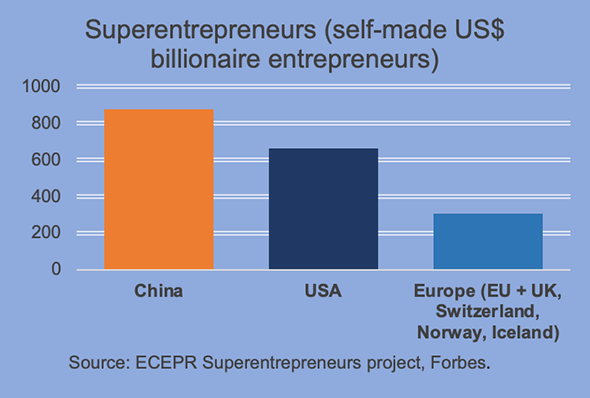
Yet, while Europe as a whole is far behind, half of the countries on the top-10 list, with most superentrepreneurs per capita, are found in Europe. Switzerland, a knowledge economy with business-friendly taxes, has 4.1 superentrepreneurs per million adults, second only to Singapore. Cyprus, a small country also with an attractive tax system, has the third highest concentration in the world. Sweden, which invests most in research and development as share of GDP amongst the European economies, has the sixth highest share of superentrepreneurs in the world. Ireland, which has a free business approach and attracts many tech companies from the USA, is also on the global top-10 list, together with the UK.
The European countries that succeed with high-level entrepreneurship are those that are focused on research and development, free enterprise, and lower tax burdens. Sweden is the exception by having a high tax level, and partially compensates for this by having advantageous tax systems for foreign investors. Other European economies, including Germany, France, Italy, and Spain – have relatively few highly successful entrepreneurs per capita. The Eastern European economies have lower taxes and are more growth oriented, but they lack the market size needed to give rise to billion-dollar companies.
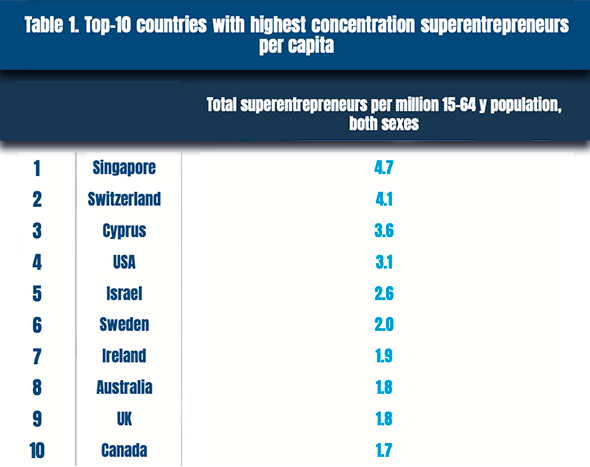
It is women´s entrepreneurship in which Europe is particularly far behind. Globally around one in 20 billionaire entrepreneurs are women. While Europe overall has a gender equal culture, the European economic models hinder entrepreneurship in women-dominated fields such as education, health, and elder care. This explains why Europe has as few as 8 women superentrepreneurs, in total – while the number is 28 in the USA, and fully 71 in China.
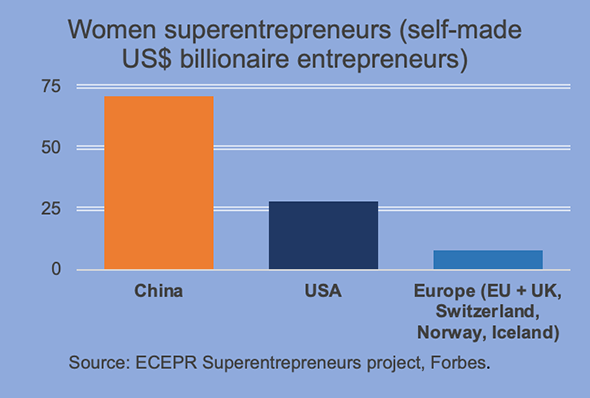
To better understand the development happening in Europe, for the last seven years we have studied the concentration of knowledge-intensive jobs in 31 European countries and 280 European regions, through the brain business jobs project. Much of the growth is happening in the capital regions of Eastern European countries, and in Southern Europe. Those parts of Europe that were previously far behind Western and Northern Europe are catching up. Additionally, the countries with lower taxes and business friendly regulation – such as Ireland – are the ones where knowledge intensive jobs are growing the fastest.
The data paint a clear picture: individual European countries are amongst the most entrepreneurial in the world, but Europe as a whole is hindered by high taxes, as well as obstacles to entrepreneurship in women-dominated sectors such as education, health, and elderly care. European economies are increasingly integrated, but far from as much as in the USA and China. With dedicated reform policies, Europe can catch up to the USA and China in entrepreneurship. For this to happen, European nations need to focus less on the prosperity that today exists, and more on new fortunes that can be created through the entrepreneurial process.
Related: The Geography of Superentrepreneurs.
Authors:
Nima Sanandaji, Director European Centre for Entrepreneurship and Policy Reform
Klas Tikkanen, Chief Operating Officer Nordic Capital
Kristoffer Melinder, Managing Partner Nordic Capital












